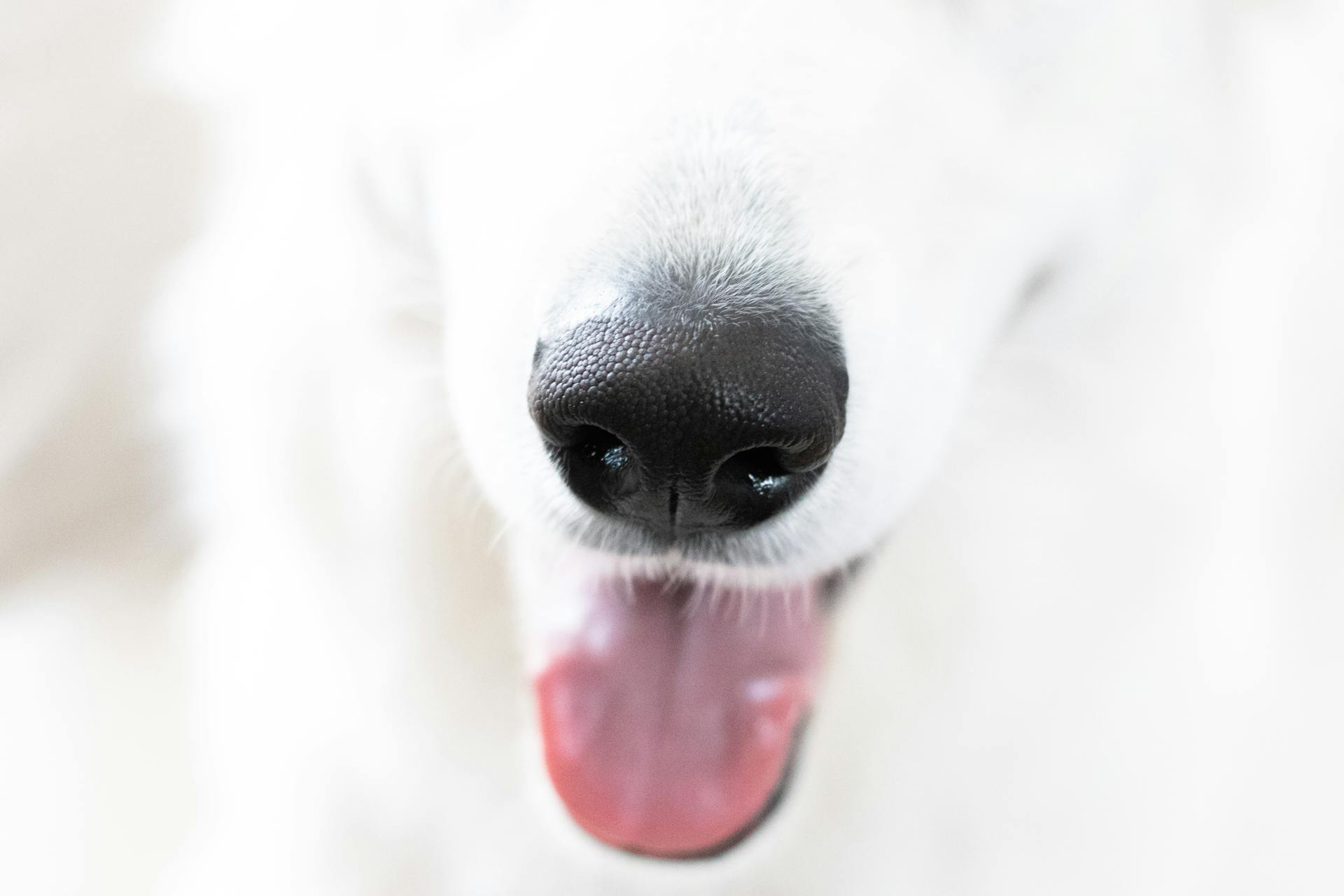
Kennel cough is a highly contagious respiratory disease that affects dogs, particularly those that are exposed to other dogs in kennels, shelters, or dog parks.
The most common cause of kennel cough is the bacterium Bordetella bronchiseptica, which can also be caused by other pathogens such as viruses and parasites.
Symptoms of kennel cough can include a persistent cough, runny nose, and lethargy, and can last anywhere from a few days to several weeks.
Kennel cough can be spread through direct contact with an infected dog's respiratory secretions, or through contact with contaminated surfaces or objects.
Additional reading: Difference between Kennel Cough and Upper Respiratory Infection
What Is Kennel Cough?
Kennel cough is a highly contagious respiratory disease that affects dogs. It's caused by a group of highly contagious respiratory infections in dogs.
The primary pathogens responsible for kennel cough are Bordetella bronchiseptica bacteria and a group of viruses, including canine parainfluenza virus and canine adenovirus. These pathogens can infect a dog's respiratory tract and cause inflammation.
Explore further: Contagious Dog Diseases
Dogs can be infected by multiple pathogens at the same time, which can lead to a more severe case of kennel cough. Close contact with other dogs is a common way for kennel cough to spread.
Bordetella bronchiseptica bacteria adheres to ciliated epithelial cells in the trachea, where it proliferates and releases toxins causing epithelial necrosis and prevents ciliary clearance. This can lead to symptoms like laryngitis, tracheitis, bronchitis, and in some cases, rhinitis.
Mortality rates for kennel cough are very low, but it's still a common disease in dogs that are housed in groups.
Additional reading: Most Common Dog Diseases
Causes and Transmission
Kennel cough is a contagious respiratory disease that affects dogs of all ages, but puppies are more prone to severe disease. It's caused by a combination of viral and bacterial infections.
The primary culprits behind kennel cough are Bordetella bronchiseptica, canine parainfluenza virus (CPIV), and canine adenovirus 2 (CAV-2). These pathogens can act alone or in combination to cause the disease.
Dogs can become infected through direct contact with other dogs, contaminated objects, or airborne pathogens. This can happen when dogs socialize with infected dogs, share contaminated objects, or inhale airborne pathogens during close proximity to infected dogs.
The most common way dogs get infected is through respiratory secretions, which can be spread through socializing with other dogs at parks, kennels, or doggy daycares.
Here are some of the key pathogens involved in kennel cough:
The disease can also be spread through contaminated objects, such as toys, food bowls, or grooming equipment used by infected dogs.
Symptoms and Signs
Symptoms of kennel cough can vary from dog to dog, but some common signs include a harsh, dry cough, sneezing, snorting, gagging, or vomiting in response to light pressing of the trachea or after excitement or exercise.
The cough is often described as a dry, hacking sound that can be triggered by excitement or exercise, and may be accompanied by sneezing fits and a clear or slightly mucus-like nasal discharge.
Expand your knowledge: Kennel Cough Dry Heaving
In some cases, affected dogs may also develop a low-grade fever, lose interest in food, and appear less energetic than usual.
Here are some common symptoms of kennel cough:
- Persistent coughing: a dry, hacking cough that sounds like honking or gagging with a retch or a hack at the end of the cough
- Sneezing and nasal discharge: some dogs may experience sneezing fits and develop a clear or slightly mucus-like nasal discharge
- Low-grade fever: some dogs may run a mild fever
- Loss of appetite and lethargy: dogs experiencing symptoms may lose interest in food and appear less energetic than usual
Clinical signs of kennel cough typically develop 3-5 days after exposure and can persist from 2-3 days to 2-3 weeks. Systemic signs, such as pyrexia, inappetance, and depression, may indicate the development of bronchopneumonia.
Related reading: Signs Dog Dying Hemangiosarcoma
Diagnosis
Diagnosis of kennel cough typically begins with a visit to the veterinarian after noticing characteristic symptoms such as a sudden cough that develops 5-10 days after exposure to other dogs.
Your veterinarian will ask questions about your dog's exposure to other dogs or multiple-dog settings, which can help strengthen suspicions of kennel cough.
A thorough examination of your dog will also be conducted to rule out other causes of cough.
Thoracic radiographs are essential to determine the severity of disease and to exclude other causes of cough, and are often normal in dogs with a cough only.
In some cases, nasopharyngeal or tracheal swabs may be taken for PCR testing to evaluate for the cause of the clinical signs.
Here are the diagnostic steps for kennel cough:
- History and clinical signs
- Radiography
- Nasopharyngeal or tracheal swabs for PCR testing (if necessary)
How Is CIRDc Diagnosed?
Diagnosing CIRDc requires a visit to the veterinarian, and it's a good idea to call ahead and describe any signs you've noticed in your dog. This helps the veterinary staff prepare for your dog's visit and prevent the spread of the disease to other patients.
The first step in diagnosis is a thorough examination of your dog for signs of illness and ruling out other causes of cough. Your veterinarian will also ask questions about exposure to other dogs or multiple-dog settings.
If your dog has mild CIRDc, they will likely improve quickly, and diagnostic tests may not be necessary. Instead, your veterinarian will make a "presumptive" diagnosis based on the dog's symptoms and exposure history.
In cases where multiple dogs are affected or the dog is getting worse despite supportive treatment, testing is recommended. This involves collecting swab samples from the throat, nose, and/or edges of the eyes and submitting them for lab testing to confirm infection and identify the specific bacteria/viruses involved.
Diagnostic tests are not always necessary, but they can provide valuable information in certain situations.
Intriguing read: Symptoms of Allergies in Dogs
Signalment
Dogs of all ages can be affected by various conditions, but some are more susceptible than others.
Puppies are often the worst affected due to their developing immune systems.
Treatment and Prevention
If your dog has kennel cough, antibiotics may be prescribed to treat any bacterial infection present.
Cough suppressants can be used if the cough is not productive.
NSAIDs are often given to reduce fever and upper respiratory inflammation.
Prevention is by vaccinating for canine adenovirus, distemper, parainfluenza, and Bordetella.
In kennels, the best prevention is to keep all the cages disinfected.
Here are some preventative measures you can take to reduce the risk of your dog contracting kennel cough:
- Vaccination: Keep your dog’s vaccinations up to date, including the kennel cough vaccine.
- Limit Exposure: Avoid situations where your dog is in close contact with unfamiliar dogs.
- Hygiene: Ensure good hygiene practices, such as cleaning and disinfecting shared objects.
- Isolate Sick Dogs: If your dog shows symptoms of kennel cough, keep them isolated from other dogs.
Antibiotics should be selected by culture and sensitivity tests of specimens collected by tracheal wash or bronchoscopy.
Prevention and Vaccination
To prevent kennel cough, vaccination is crucial. It's essential to keep your dog's vaccinations up to date, including the kennel cough vaccine, as it may reduce the severity of clinical signs but may not prevent an infection.
Vaccination should be administered as soon as possible after a dog enters a high-risk area, such as a shelter, with 10 to 14 days required for partial immunity to develop.
The standard (or "core") canine vaccines are highly effective against some CIRDC-associated viruses and are recommended for all dogs. For optimal protection against common respiratory infections, an annual intranasal vaccine against Bordetella, canine adenovirus type 2, and canine parainfluenza is recommended for dogs of certain at-risk groups.
A combination of an avirulent B bronchiseptica and a modified-live parainfluenza vaccine is available for intranasal use, with one inoculation administered to puppies >3 weeks old.
To increase their effectiveness, vaccines should be administered as soon as possible after a dog enters a high-risk area, such as a shelter.
Here are some key vaccination schedules:
Remember, vaccines are not always effective, and even vaccinated dogs can still contract mutated strains or less severe cases of kennel cough.
Complications and Prognosis
Complications can arise from kennel cough, especially if secondary infections develop. These infections can be caused by bacteria such as Streptococcus, Pasteurella, Pseudomonas, and various coliform bacteria.
Dogs with kennel cough may experience complications like pneumonia or sepsis, which can increase the severity of the disease. These complications can be evident in thoracic radiographic examinations.
Most cases of kennel cough resolve within 4 weeks with proper care, but monitoring your dog closely is crucial to catch any signs of complications. If your dog becomes more lethargic, stops eating, or the sound of the cough changes, seek veterinary care right away.
On a similar theme: Kennel Cough Bacteria
Complications
Dogs with kennel cough can develop secondary infections that lead to complications.
These complications can be caused by opportunistic invaders such as Streptococcus, Pasteurella, Pseudomonas, and various coliform bacteria.
These bacteria have the potential to cause pneumonia or sepsis, which can drastically increase the severity of the disease.
Thoracic radiographic examinations can reveal the extent of the complications.

Animals affected only by kennel cough will have mild findings, while those with complications may have evidence of segmental atelectasis, or a collapsed lung.
Complications can lead to severe side effects, making it essential to monitor your dog's health closely.
The sooner complications are identified, the better the chances of a successful treatment and recovery.
Prognosis for Dogs
Most cases of kennel cough resolve within 4 weeks with proper care. If your dog's symptoms persist or worsen, it's essential to seek veterinary care.
Prognosis for dogs with kennel cough is generally positive. However, complications can arise, such as pneumonia, even in previously healthy dogs.
Prompt veterinary attention is crucial if you suspect your dog is developing complications. This includes monitoring your dog closely for signs of lethargy, loss of appetite, or changes in the sound of their cough.
Radiographs to check for pneumonia may be recommended if your dog is showing these symptoms.
Check this out: Kennel Cough Pneumonia
Sources
- https://www.merckvetmanual.com/respiratory-system/respiratory-diseases-of-small-animals/kennel-cough
- https://en.wikipedia.org/wiki/Kennel_cough
- https://vetsoftherockies.com/education/kennel-cough-understanding-canine-infectious-respiratory-disease-complex/
- https://www.avma.org/resources-tools/pet-owners/petcare/canine-infectious-respiratory-disease-complex-kennel-cough
- https://en.wikivet.net/Canine_Infectious_Tracheobronchitis
Featured Images: pexels.com


